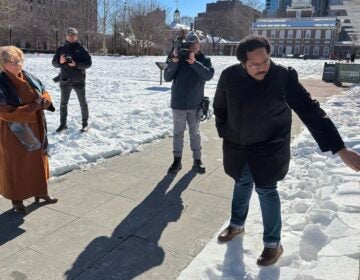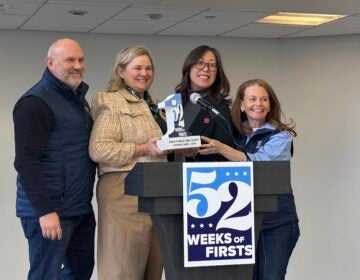Teenagers discover Shakespeare, and something about themselves, in Germantown
Young aspiring actors gather together at the Awbury Arboreteum’s Francis Cope House on Saturdays. There, they bring the words of Shakespeare to life.
Suddenly, a room that only housed a fireplace and an oriental rug, transforms into a stage. For 10 weeks, these teens have a place to be or not to be, where they ask friends, Romans and countrymen to lend their ears, and try to figure out wherefore art Romeo.
The Quintessence Theatre Group, which is dedicated to the performance and adaptation of epic works of classic literature and drama for the contemporary stage, hosts a Quintessence Shakespeare Youth Workshop under the direction of Alexander Harvey.
When Harvey was 8, he saw “A Midsummer Night’s Dream” in a park underneath a huge tree by the seaside in Manchester, Mass. It was almost like Harvey drank the potion that Puck had created because suddenly, he was in love.
“I think it was something about how mischievous [Puck] was, and the magical powers he had,” Harvey recounted. “To an eight-year-old, that’s the coolest thing ever.”
Shakespeare became his life
Harvey worked with the Rebel Shakespeare Company when he was growing up, and studied at the Royal Academy of Dramatic Art, the Bristol Old Vic Theatre School and Syracuse University.
When he was 11, he took a trip to England with his local Shakespeare company. They toured The Globe, going backstage, talking to the actors and even standing on stage.
“I thought, ‘I hope this isn’t the last time I am on this stage.’ And it wasn’t,” he said. “So it was a very big thing for 11-year-old me to come back [and study] as a 21-year-old.”
Since Harvey fell in love with Shakespeare at such a young age, it only makes sense that he should lead the next generation of fans like the eager group of students with whom he’s currently working.
Modern-day Shakespeare
After a series of stretches, Harvey handed each student a neon yellow tennis ball. The students looked at each other with a little confusion as Harvey explained how this tennis ball would help them with the delivery of their monologues.
He told the students that by having them toss the ball up and down, they are externalizing something, not focusing on themselves. It allows them to stop worrying about whether they are doing a good job, he said.
“I try to teach Shakespeare in the most physical way possible, getting it into your body, resisting it,” Harvey explained. “You need to have your mind sharp as a tack, of course, and you have to be able to think these huge eight-line thoughts before you say them. But the rhythm is so muscular.”
But do these young teenagers actually understand the complicated world of Shakespeare, where words seem to marinate together only to turn into a ball of gibberish?
“I think when you are younger, you haven’t been told that Shakespeare is difficult yet. You are willing to embrace it in a really playful way,” he said. “You just get thrown into it and don’t worry thinking, ‘Oh God, Shakespeare is so difficult. Oh my God, I don’t understand everything that is being said.’ But a lot of time the kids hold on to it right away, just the sound of it. They just love it.”
The students
Joe Newmann, 14, worked with Quintessence during a performance of “Henry V” and now finds himself as a student in the Youth Shakespeare Workshop.
Thanks to the class, he is really able to hold on to the complicated language.
“I am beginning to understand it more. Thanks to this class, more things are being revealed to me,” Newmann said at a recent session. “I am not a master or anything, but it has helped me pick apart words and pick apart more specific details in the class. I probably would not have been able to do if I had just been reading it.”
Ellianna McLaughlin, 14, commented on the open space in which Harvey allows his students to perform.
At the beginning of each class, every student says something good about his or her day and something bad. Doing this creates an environment where students feel free to loosen up.
“You don’t feel embarrassed. I took other acting classes but with Alex, it’s different,” McLaughlin said. “In other acting classes, they tell you this is how it’s supposed to be done, but he says, ‘Well, what’s your interpretation of what we are doing now?’ He gives you a chance.”
That’s all Harvey said he hopes to do.
By the end of the workshop, there will be no flashy production. The performance space will still just contain a fireplace and an oriental rug, but with their parents and friends in the audience, this will be their stage.
“When the time comes when their parents get to see what they have done, that alone will make for a really exciting show for everyone,” Harvey said. “They get to say, ‘This is what I did.’ And they love what they’ve done and they really just get to go. It’s all theirs. It’s not me, it’s not my directing of them, it’s theirs. That’s what really gives me the most pleasure, helping them unlock themselves.”
****
Kelsey Doenges and Amanda DiLoreto are students at Temple University. Philadelphia Neighborhoods, a NewsWorks content partner, is an initiative of the Temple Multimedia Urban Reporting Lab.
WHYY is your source for fact-based, in-depth journalism and information. As a nonprofit organization, we rely on financial support from readers like you. Please give today.




